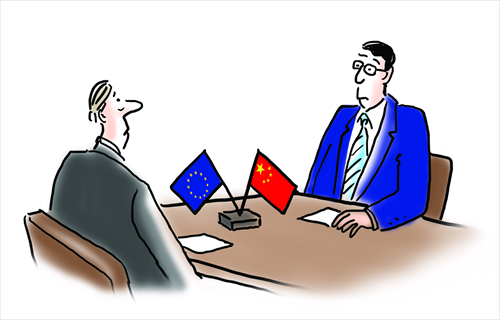HOME >> OP-ED
Shortsighted EU sacrifices China cooperation
By Cui Hongjian Source:Global Times Published: 2016/7/26 23:28:01

Illustration: Liu Rui/GT
The recent 18th China-EU summit was held at a difficult time for both sides. While the EU leaders were still adapting themselves to the UK's decision to quit the union, China is also under the spotlight following the South China Sea arbitration case. China and the EU have seen various divergences this year: China's "market economy status" (MES) has to be discussed between both leaders, and the EU owes China an explanation over its reckless actions on China's peripheral issues. Therefore, the two sides have to devote more energy to solving disputes this year.
The EU has attached great importance to its relationship with China, its strategic partner, and made preparations for the summit. A joint communication entitled "Elements for a new EU strategy on China" was published before the meeting, in an attempt to set tunes for the future China-EU relationship. Although the document has voiced disappointment on China, it regards the China-EU relationship highly, especially China-EU cooperation in promoting the Belt and Road initiative.
However, the EU's aspiration to build intimate ties with China is once again defeated by its shortsightedness for immediate interests. It succumbed to the European Parliament over China's MES. Shirking its responsibilities, the EU has taken the MES issue, which could have further strengthened China-EU mutual political trust and economic cooperation if addressed, as a tool to pressure China on over-capacity in an attempt to upgrade its own trade protection system. In addition, while the EU said it takes no position on China's peripheral issues, it publicly claimed the South China Sea arbitration as important, implying that China should "respect" the result of arbitration, and turned a blind eye to its members' petty actions against China. The EU, with such an aggressive stance, is making troubles for the China-EU relationship. Therefore, it is not surprising that there was no press release or joint statement at this year's summit.
The so-called MES issue is a false proposition, which attempts to politicize an economic issue. China has never been bothered by this, as the market economy is gradually improving in China and does not need to be approved by a foreign institution. What China needs is the EU, which advocates "fair trade," to treat China's products on a fair basis. China does not want to see the EU using over-capacity as an excuse to protect its industries with low competitiveness, or to upgrade its trade protection system.
As an important trading partner of the EU, China respects and is obliged to protect the trade channels between China and the EU, including the South China Sea. Regarding South China Sea issue, a prudent outside country is needed to create a favorable environment for concerned parties to diplomatically address the disputes. China offered tremendous political and economic support to the EU when the bloc was stricken by the debt crisis and the UK referendum. The EU's shortsightedness and selfishness are disappointing. Although held at a difficult time, the China-EU summit could have been more fruitful. As a byproduct of the gloomy global economy, over-capacity should not cause trouble between China and the EU, but should be seized as an opportunity by the two sides to cooperate on industrial chain integration. This will help not only address global over-capacity, but also realize industrial upgrading in the EU.
The South China Sea disputes could also have been an opportunity for China and the EU to enhance mutual trust. The EU, if taking a fair stance, should have played a constructive role to ease the tensions in the region, which can guarantee and enhance the EU's interests and influences in the region. However, perplexed by internal and external crises, or attempting to save face as a weakening union by being tough on China, the EU has failed to seize this opportunity.
China and the EU have more significant issues to deal with. The China-EU bilateral trade volume has seen a continuous decrease these years, far from the target of reaching $1 trillion by 2020. France and Germany were hit by a string of terror attacks, and anti-terrorism should be an urgent agenda for China and the EU.
Owing to the EU's mistakes, the summit missed many opportunities to cooperate. We hope the EU elites wake up and save China-EU cooperation from being sacrificed to their mistakes.
The author is a director of the Department of European Studies, China Institute of International Studies. opinion@globaltimes.com.cn
Posted in: Viewpoint